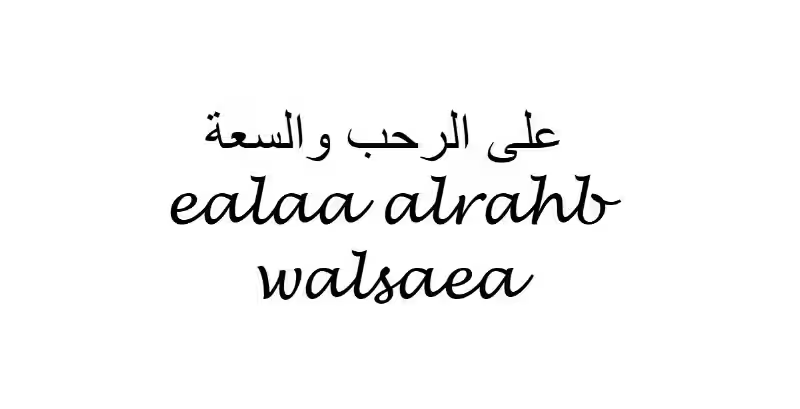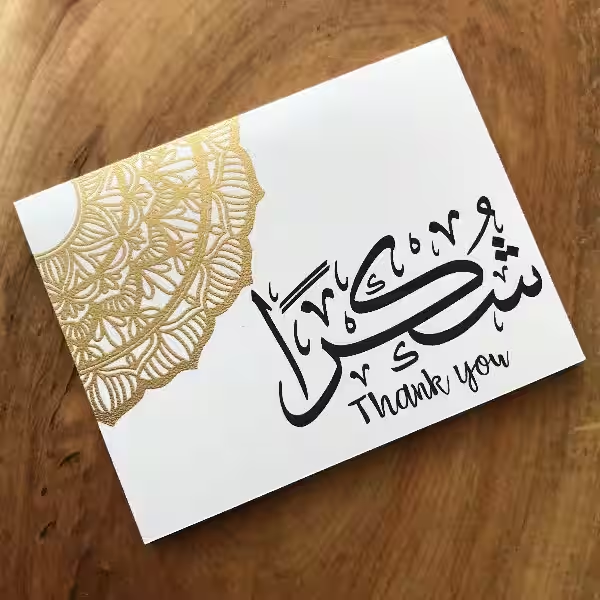
In Arabic culture, expressing gratitude is not merely a polite gesture but a way to foster harmonious relationships and build strong bonds. Saying “You’re welcome” goes beyond a simple acknowledgment; it’s a reflection of your appreciation for the kindness shown and a willingness to reciprocate that generosity. This guide explores the diverse ways to express “You’re welcome” in Arabic, highlighting the nuances and cultural significance behind each phrase.
Standard Arabic Expressions of Gratitude
While Arabic is a rich and diverse language with many dialects, Standard Arabic offers a foundation for understanding the core expressions of gratitude. These phrases are commonly used across the Arab world, serving as a universal language of appreciation.
Afwan (عفوًا): The Universal “You’re Welcome”
Afwan is the most straightforward and common translation of “You’re welcome” in Standard Arabic. It’s a simple, yet powerful way to acknowledge someone’s thanks and express your willingness to help. For instance, if someone thanks you for holding the door open, you can simply say, “Afwan” to express your gratitude.
Ala Al-rahbi Wa As-se’ah (على الرحبِ والسعة): A Warm and Welcoming Response
This expression translates literally to “On the welcome and spaciousness.” It conveys a sense of “My pleasure” or “You’re most welcome,” implying that the act of helping was a joy and not a burden. Imagine a friend offering you a delicious meal; you could reply with, “Ala Al-rahbi Wa As-se’ah” to express your genuine appreciation for their hospitality.
La Shukr Ala Wajib (لا شُكر على واجب): Emphasizing Duty and Obligation
This phrase literally means “No need to thank, it’s my duty.” It suggests that the act of help was a natural obligation, implying that you were happy to assist and don’t require any special recognition. For example, if someone thanks you for helping them carry groceries, you could say, “La Shukr Ala Wajib” to emphasize that it was a simple act of helpfulness.
Regional Variations: A Colorful Tapestry of Gratitude
Arabic dialects add a vibrant layer of diversity to the expression of gratitude. Each region has its own unique phrases that reflect their local customs and traditions. Learning these variations can enhance your understanding of Arabic culture and allow you to connect with people on a deeper level.
Egyptian Arabic: A Mix of Formality and Familiarity
In Egyptian Arabic, El’afw (العفو) is the most common translation of “You’re welcome,” similar to Afwan in Standard Arabic. However, Egyptians also employ phrases like Taḥt amrak (تحت أمرك) or Taḥt amrik (تحت أمرِك) for a female, meaning “At your service,” which adds a layer of formality. For a more casual tone, they often use Wala yihimmak (ولا يهمك) for a male, Wala yihimmik (ولا يهمِك) for a female, or Wala yihimukum (ولا يهمكم) for a group, signifying “Don’t mention it.” These phrases reflect the warmth and hospitality that characterize Egyptian culture.
Gulf Arabic: Warmth and Generosity
In the Gulf region, Hayyak Allah (حياك الله), meaning “May God greet you,” is a warm and formal way to express “You’re welcome.” This phrase conveys a sense of genuine hospitality and blessings, reflecting the generous and welcoming nature of Gulf societies.
Levantine Arabic: A Blend of Formality and Familiarity
Levantine Arabic, spoken in countries like Lebanon, Syria, and Jordan, offers a rich tapestry of expressions for “You’re welcome.” Tikram (تكرم) for a male, Tikrami (تكرمي) for a female, or Tikramu (تكرموا) for a group, literally means “At your service,” conveying a willingness to help. Ahla w sahla (أهلا وسهلا), meaning “You’re welcome,” is a common and welcoming phrase. ʿala ʿayni (على عيني), signifying “On my eyes,” expresses a deep willingness to assist, signifying a commitment to fulfilling the request.
Darija (Maghrebi Arabic): A Touch of Poetic Charm
Maghrebi Arabic, spoken in North Africa, offers unique expressions that are both polite and poetic. B’sslama (بالسلامة), meaning “With peace,” is a polite expression of farewell, often used in conjunction with a thank you. ʿAychek (يعيشك), meaning “May you live,” is an expression of courtesy used to acknowledge thanks. These phrases showcase the lyrical nature of Maghrebi Arabic and its emphasis on wishing well upon others.
Beyond Words: The Cultural Significance of Gratitude
The ways to say “You’re welcome” in Arabic extend beyond mere linguistic expressions. It’s about embodying a spirit of gratitude and recognizing the value of kindness. In Arab culture, acknowledging gratitude is crucial for building strong relationships, fostering trust, and creating a harmonious social fabric. By learning and using these expressions, you demonstrate respect, politeness, and a willingness to engage in positive interactions. It’s a way to show appreciation for the generosity and hospitality that are deeply ingrained in Arab traditions.
So, the next time someone expresses gratitude to you in Arabic, remember that a simple “You’re welcome” can go a long way in fostering a deeper connection and creating a lasting impression. Embrace the diversity of Arabic expressions and experience the rich tapestry of gratitude that makes Arabic culture so vibrant and welcoming.
Frequently Asked Questions about “You’re Welcome” in Arabic
How do you say “You’re welcome” in standard Arabic?
Afwan (عفوًا)
What are some other ways to say “You’re welcome” in standard Arabic?
Ala Al-rahbi Wa As-se’ah (على الرحبِ والسعة), La Shukr Ala Wajib (لا شُكر على واجب), Men Dawa’y Sorory (من دواعي سروري), Ahlan Bik Fi Ay Wakt (أهلًا بك في أيّ وقت), La Alaik (لا عليك), Ash-shukru Lillah (الشُكر لله)
How do you say “You’re welcome” in Egyptian Arabic?
El’afw (العفو), Taḥt amrak (تحت أمرك) or Taḥt amrik (تحت أمرِك) for a female, Wala yihimmak (ولا يهمك) for a male, Wala yihimmik (ولا يهمِك) for a female, Wala yihimukum (ولا يهمكم) for a group
How do you say “You’re welcome” in Gulf Arabic?
Hayyak Allah (حياك الله)
How do you say “You’re welcome” in Levantine Arabic?
Tikram (تكرم) for a male, Tikrami (تكرمي) for a female, Tikramu (تكرموا) for a group, Ahla w sahla (أهلا وسهلا), ʿala ʿayni (على عيني)
How do you say “You’re welcome” in Darija (Maghrebi Arabic)?
B’sslama (بالسلامة), ʿAychek (يعيشك)
- Afwan (عفوًا): The most common Arabic translation for “You’re welcome.”
- Ala Al-rahbi Wa As-se’ah (على الرحبِ والسعة): Means “My pleasure” or “You’re most welcome.”
- La Shukr Ala Wajib (لا شُكر على واجب): Translates to “No need to thank, it’s my duty.”
- Men Dawa’y Sorory (من دواعي سروري): Means “It is my pleasure,” expressing genuine delight in helping.
- Ahlan Bik Fi Ay Wakt (أهلًا بك في أيّ وقت): Conveys “You’re welcome, anytime,” offering continued hospitality.
- La Alaik (لا عليك): Similar to the English “Never mind” or “Don’t mention it.”
- Ash-shukru Lillah (الشُكر لله): Means “All thanks to God,” reflecting humility.
- El’afw (العفو): Common Egyptian Arabic translation of “You’re welcome.”
- Taḥt amrak (تحت أمرك) or Taḥt amrik (تحت أمرِك): “At your service” in Egyptian Arabic.
- Wala yihimmak (ولا يهمك) or Wala yihimmik (ولا يهمِك): “Don’t mention it” in Egyptian Arabic.
- Hayyak Allah (حياك الله): “May God greet you,” a warm and formal Gulf Arabic expression.
- Tikram (تكرم) or Tikrami (تكرمي): “At your service” or “You’re welcome” in Levantine Arabic.
- Ahla w sahla (أهلا وسهلا): “You’re welcome,” a common Levantine Arabic phrase.
- ʿala ʿayni (على عيني): “On my eyes,” signifying a deep willingness to help in Levantine Arabic.
- B’sslama (بالسلامة): “With peace,” a polite Maghrebi Arabic expression of farewell.
- ʿAychek (يعيشك): “May you live,” a Maghrebi Arabic expression of courtesy.








